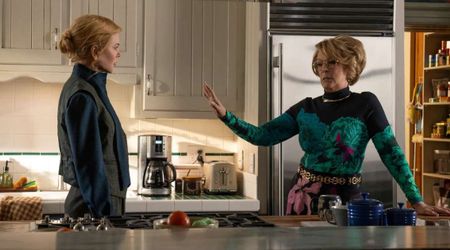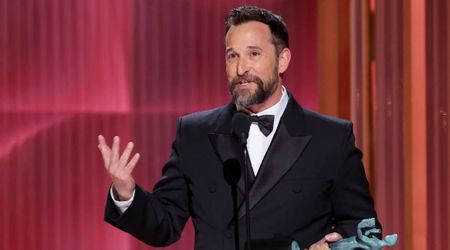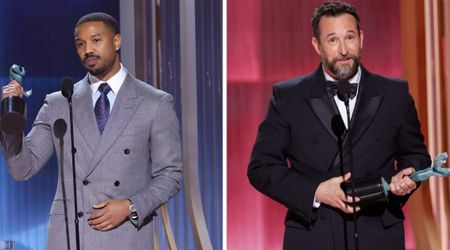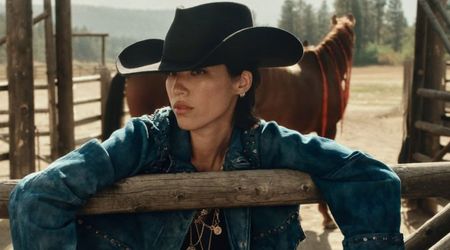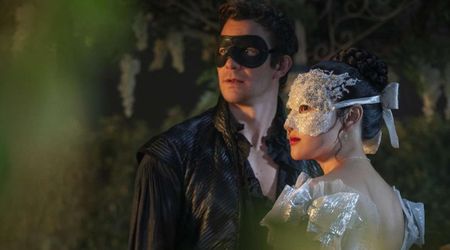'My Brilliant Friend' Season 2 Episode 3 sees Lila become a one-woman army against class inequality

One of the pleasures of watching this show is how key scenes interlace the drama between characters with a layered take on gender, class and societal norms. You want to immediately rewind and replay these scenes because each look, each gesture, every word is laden with significance.
Episode 3, titled 'Erasure', features three scenes in particular that you want to unpack, in all their delicious glory. All of them showcase how Lila (Gaia Girace) has grasped how essential class divide is to capitalism and societal inequality.
The first comes right at the start after Lila reclaims her wedding dress photograph by cutting it up into a discordant collage. Her first cut is right across her face in the picture because she is determined to erase her likeness after it was bartered by her husband for petty ends.
However, even within this destructive act, her creativity shines through -- though only Michele Solara recognizes how the avant-garde photo collage is exactly what his upper-class clientele will lap up.
But she lights into her brother Rino Cerullo when she discovers that the shoe store is called "Solara". Her angst is centered around the fact that the shoes made by the Cerullos (based on her designs) are being sold under the "Solara" brothers brand. "Did you borrow money from them? Stephano too? That's why you do whatever they say!" The exchange is her first realization that the capitalist Solaras, with their money power, have the ability to buy her talent and beauty, even when she is unwilling to let them profit from what belongs to her.
This is why we even see her take a perverse pleasure in the poet Donato Sarratore's review of the shoe store that calls her collage a "discordant" note in the otherwise "magnificent" store interiors. "It's the only one that's true," she says, telling Lenu aka Elena Greco (Margherita Mazzucco) that all the other reviews are paid for with money "that stinks". In this second scene in the grocery store, we also have her analyze how Stephano's money comes from his father, who was a loan shark, while the Solaras are loan sharks and black marketeers. She reveals that Stephano had also taught her how to cheat customers and she perfects these methods because, being Lila, she has to be the best at everything.
She explains her realization to Lenu that Stephano and the Solaras had joined hands to "grow the money", sucking their neighborhood dry as they got richer just like their fathers and their fathers before them. Her analysis pinpoints how capitalism works, consolidating wealth and power in the hands of the few while impoverishing everyone else.
She also takes it on herself to reverse this flow of wealth and prosperity by giving away goods from the grocery store to those who most need it, like Giuseppina Peluso, whose husband is in prison. She also buys Lenu new books for the school year to make sure that Lenu, through education, becomes one of the haves rather than the have-nots.
The third scene has her sit in stony silence at the party at Professor Galiani's house and then the disastrous ride home during which she sarcastically taunts Lenu for becoming a "parrot" with no original ideas.
Professor Galiani is a rich leftist intellectual and her admirers and students are also from the elite strata of society or trying to be elite like Nino Sarratore and Lenu. Professor Galiani and her ilk have studied about societal inequality and hold discourses about it but have no real-life understanding of what it means to be poor or the rigors of growing up in a poor neighborhood like Lila, Lenu and, to some extent, Nino (who managed to escape their neighborhood early).
So Nino's ideas about a "peaceful revolution", that is parrotted by Lenu, drive Lila crazy. She is already on a warpath against the inequalities she notices and experiences every day in her working-class neighborhood and she knows that there is nothing "peaceful" about genuine rebellion, like hers.
She has nothing but ire for the snobby fakeness of these hypocritical leftist intellectuals who pretend to care and who also, as she points out to Lenu in her sarcastic diatribe, have inherited their wealth. In her eyes, even Stephano, with his grubby money-making ways, is more genuine and thus bearable.
Other reviews of the show have pointed out that her rant against Lenu is a reflection of her jealousy. While there is an element of that, she is actually angrier at Lenu for letting her down by parroting books and ideas that are not hers. In Lila's eyes, Lenu should know better and school these rich snobs about societal inequality rather than adopt their lingo to fit in, superficially.
She knows Lenu is not being "brave" or "intelligent" -- she is being exactly the opposite; she is being too stupid or too scared to voice the truth she has lived and experienced. Having always seen Lenu as an equal, she had believed that Lenu was arming herself with an education as an act of rebellion.
At the party, Lila realizes, Lenu is educating herself to find ways to conform, to fit in, in an elitist circle. Her disappointment of losing her to this elitism fuels her anger towards Lenu, driving her away. Lila is a revolutionary in her bones and episode 3 brings out starkly how she is training herself to be a one-woman army against class inequality.
'My Brilliant Friend' airs on HBO on Mondays at 10 pm.

